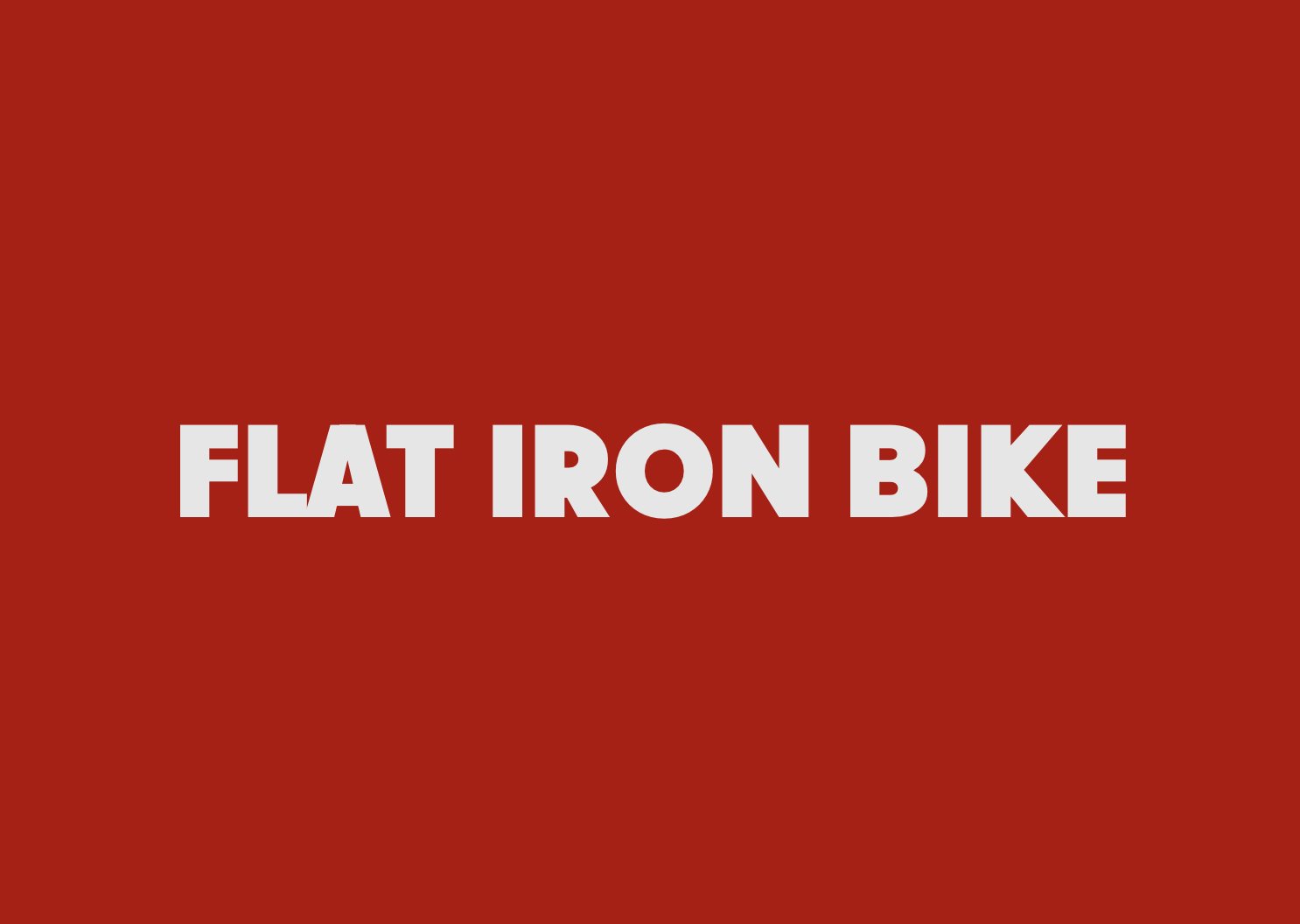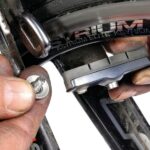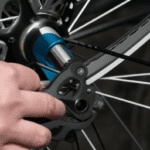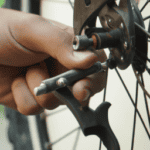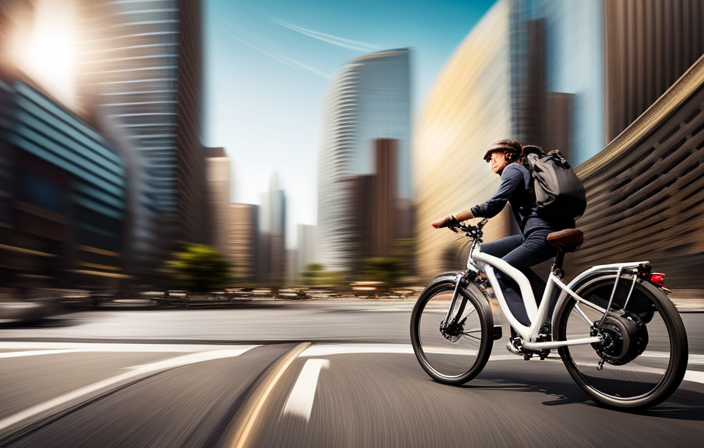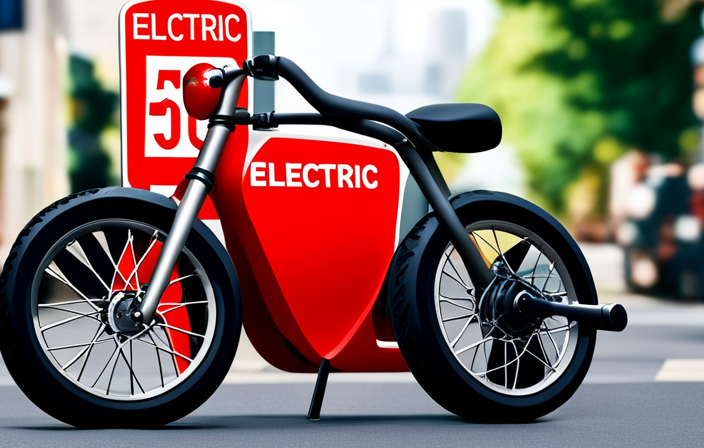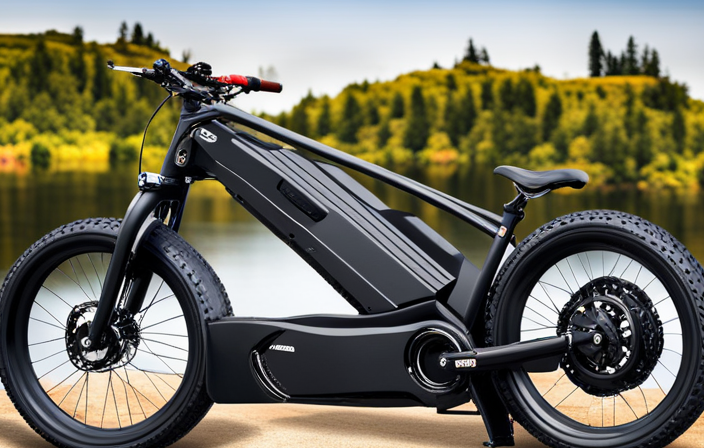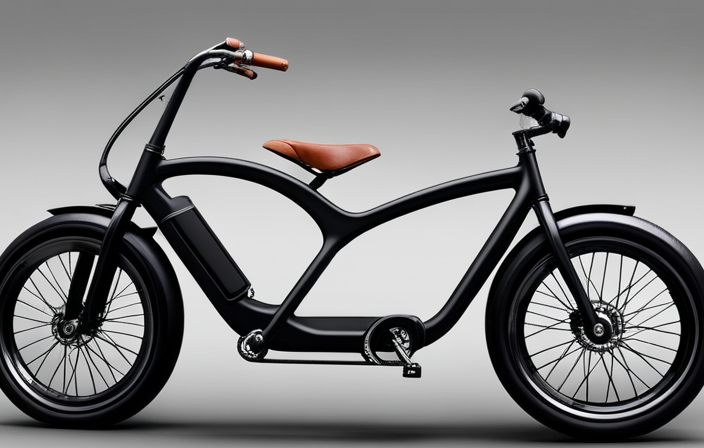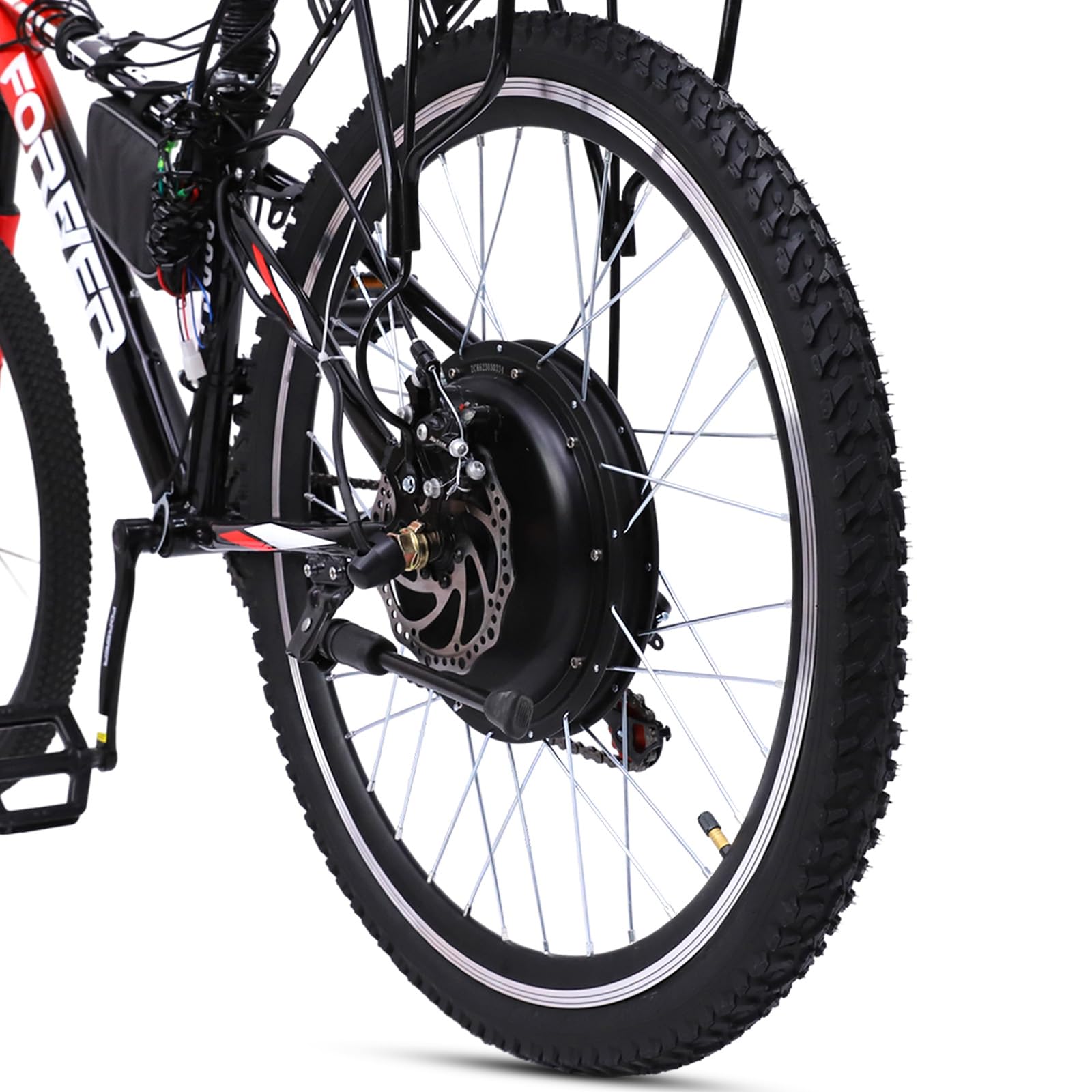Bike
Bicycle Disc Brakes Squeaking When Stopping
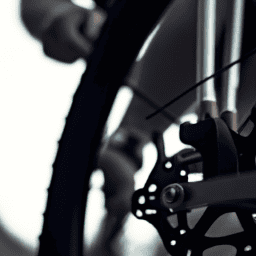
Do you notice a sharp, squealing noise each time you apply your bike’s brakes? This issue can be both annoying and diverting, particularly when you’re looking to have a tranquil ride or are in the midst of a competition. Luckily, there are multiple ways to fix this problem, based on what’s causing the squeak.
In this article, we’ll guide you through the basics of disc brakes, common causes of squeaking, how to diagnose the problem, and how to fix it.
First, let’s review the basics of disc brakes. Unlike traditional rim brakes, which use friction between rubber brake pads and the metal rim of the wheel, disc brakes use a rotor attached to the wheel hub. When you squeeze the brake lever, a set of brake pads clamp down on the rotor, slowing down the wheel. This design offers several advantages, including greater stopping power, more consistent performance in wet or muddy conditions, and less wear on the rim.
However, disc brakes can also be more complex and prone to issues such as squeaking, which we’ll explore in more detail below.
Key Takeaways
- Contaminated brake pads, worn rotors, and misaligned calipers are common causes of squeaking in bicycle disc brakes.
- Regular maintenance, including inspecting brake pads and rotors, ensuring proper caliper alignment, and lubricating brake components, can prevent future brake issues and reduce squeaking.
- Choosing the right type of brake pad, such as organic, semi-metallic, or metallic, is important for optimal performance and noise reduction.
- Adjusting brake cable tension can also affect brake performance and noise, and using the wrong type of lubricant can damage the brake system.
Understand the Basics of Disc Brakes
You’re gonna love learning about disc brakes! They’re a crucial part of your bike’s stopping power. Disc brakes have several advantages over traditional rim brakes.
They provide better stopping power, especially in wet or muddy conditions, and are less affected by wheel or rim damage. Disc brakes also last longer and require less maintenance than rim brakes.
There are different types of brake pads available for disc brakes, each with their own unique characteristics. Organic brake pads are softer and provide better modulation, but wear out faster than metallic pads. Metallic pads are harder and last longer, but can be noisier and may wear down the rotor faster.
Understanding the differences between these types of brake pads can help you choose the right one for your needs.
Now, let’s move on to the common causes of squeaking when using disc brakes.
Common Causes of Squeaking
If you’re experiencing a squeaking noise when you apply your bicycle’s disc brakes, it’s likely due to one of three common causes:
- Contaminated brake pads: caused by oil or dirt on the pads.
- Worn rotors: a result of normal wear and tear over time.
- Misaligned calipers: can cause uneven pressure on the rotor, resulting in a squeaking noise.
Understanding these causes can help you diagnose and fix the issue with your disc brakes.
Contaminated Brake Pads
Dirty or dusty debris on brake pads can cause disturbing screeching sounds when stopping on a bike. Contaminated brake pads are a common cause of squeaking in bicycle disc brakes. When the brake pads become contaminated with oil, grease, or dirt, they lose their ability to grip the rotor effectively, resulting in a high-pitched noise.
To fix this issue, you can start by cleaning the brake pads thoroughly. Use a gentle cleaning solution and a soft-bristled brush to remove any dirt or debris from the brake pads. If the contamination is severe, you may need to replace the brake pads entirely.
Replacement options include organic, semi-metallic, and metallic brake pads, each with their own pros and cons. It’s essential to choose the right type of brake pad for your bike and riding style.
If you’ve tried cleaning or replacing the brake pads and are still experiencing squeaking, it may be time to check the condition of your rotors. Worn rotors can also cause squeaking, and if they’re too damaged, they may need to be replaced.
Worn Rotors
Having worn rotors can lead to a lack of proper braking performance and a high-pitched noise when coming to a stop on a bike. If your bicycle disc brakes are producing a squeaking sound, you may need to replace the rotors.
Over time, the rotors can wear down due to friction from the brake pads, resulting in a decrease in surface area, which affects the ability to stop the bike efficiently. To determine if your rotors need replacement, inspect them for any signs of wear. You can also check the thickness of the rotor with a caliper and compare it to the manufacturer’s specifications.
If the thickness is below the recommended level, it’s time to replace the rotors. Additionally, it’s important to check the brake pad wear regularly as worn brake pads can also contribute to rotor wear and reduce braking performance.
Moving on to the next topic, misaligned calipers can also cause noise and affect the performance of your bicycle disc brakes.
Misaligned Calipers
You may notice that your calipers are misaligned, causing a rubbing or dragging sensation when you brake on your bike. This can happen due to wear and tear, improper installation or adjustment, or even from a crash.
To fix this issue, you’ll need to adjust your calipers. Caliper adjustment can be done by loosening the bolts that hold the caliper in place, aligning the caliper with the rotor, and then tightening the bolts back up. It’s important to note that the caliper should be centered over the rotor and shouldn’t touch the rotor when it’s not engaged.
Additionally, if your brake pads are worn, you may need to replace them before adjusting the calipers to ensure optimal performance. Once your calipers are properly aligned, your brakes should operate smoothly and without any rubbing or dragging sensation.
Now that you know how to align your calipers, the next step is to diagnose the problem. This will help you determine if the misaligned calipers were the root cause of your squeaking brakes or if there’s another issue that needs to be addressed.
Diagnose the Problem
First, take a close look at the brake pads and rotors to see if there are any visible signs of wear or damage. Check the brake pads for any uneven wear or glazing, which could cause the brakes to squeak. If the pads are worn down, it may be time to replace them.
Additionally, inspect the rotors for any grooves or cracks, as these can also cause the brakes to squeak.
Next, try adjusting the brake cable tension. If the cable is too loose, it can cause the brakes to squeak when applied. Similarly, if the cable is too tight, it can cause the brake pads to rub against the rotor even when the brakes are not being applied, resulting in a constant squeaking noise.
Once you have diagnosed the problem, it’s time to move on to fixing the issue and ensuring your bike’s brakes are functioning properly.
Fix the Issue
Now it’s time to roll up your sleeves and get to work fixing the screeching sounds coming from your bike’s braking system, so you can smoothly glide through your rides without any screeching interruptions.
The first step in fixing the issue is to ensure that your brake components are properly lubricated. This can be done by removing the brake pads and applying a small amount of lubricant to the caliper arms and the brake pad mounting points. Be sure to use a lubricant that’s specifically designed for bike components, as using the wrong type can damage your brakes.
If proper lubrication does not solve the issue, it may be necessary to replace the brake pads altogether. This is a straightforward process that involves removing the old brake pads and inserting new ones. When selecting replacement pads, be sure to choose ones that are compatible with your bike’s braking system. It’s also important to properly align the new pads to ensure they make full contact with the braking surface.
By properly lubricating your brake components and replacing worn brake pads, you can eliminate the screeching sounds coming from your bike’s braking system.
In the next section, we’ll discuss some preventative measures you can take to avoid this issue in the future.
Prevent Future Squeaking
To ensure a smoother and more enjoyable ride, it’s important to take preventative measures against future brake issues. Regular maintenance is key to keeping your bicycle disc brakes functioning properly. This includes inspecting the brake pads for wear and tear, checking the rotor for any damage, and ensuring the brake calipers are properly aligned. Regular maintenance can prevent issues like uneven brake wear and squeaking.
Another way to prevent future squeaking is by following proper lubrication tips. Applying a small amount of lubricant to the rotor and brake pads can help reduce friction and prevent the brakes from squeaking. However, it’s important to use a lubricant specifically designed for bicycle disc brakes, as other lubricants may damage the brake system. By regularly maintaining and lubricating your bicycle disc brakes, you can prevent future squeaking and ensure a smooth and safe ride.
| Maintenance Task | Recommended Frequency | Tools Needed |
|---|---|---|
| Inspect brake pads for wear and tear | Every 100 miles | None |
| Check rotor for damage | Every 500 miles | None |
| Ensure brake calipers are properly aligned | Every 500 miles | Allen wrench |
| Lubricate brake pads and rotor | Every 500 miles | Brake lubricant |
Frequently Asked Questions
Can I use any type of brake pads on my bicycle’s disc brakes?
When selecting brake pads for your bicycle’s disc brakes, it is crucial to ensure compatibility with your specific brake system. Different pads may have varying performance comparisons, so research and experimentation may be necessary for optimal results.
How often should I replace my brake pads to prevent squeaking?
To prevent squeaking, replace your brake pads before they wear down completely. Brake pad lifespan depends on factors like usage and weather conditions. Squeaking prevention techniques include cleaning the rotors and using high-quality pads.
Is it normal for disc brakes to make some noise when stopping?
Disc brake noise is normal, but excessive noise can be caused by worn or contaminated pads, rotor damage or misalignment. Regular maintenance and cleaning can prevent noise and ensure proper brake function.
Can adjusting the brake calipers help reduce or eliminate squeaking?
To reduce or eliminate brake squeaking, adjust the brake calipers using the correct technique and ensure proper alignment. Consider using lubrication options on the brake pads and rotors.
Will switching to a different brand of brake pads or rotors solve the squeaking issue?
Switching to a different brand of brake pads or rotors may or may not solve the squeaking issue. Proper installation techniques and using different brake pad materials can also help reduce or eliminate noise.
Conclusion
Congratulations! You’ve successfully silenced those pesky squeaks coming from your bicycle’s disc brakes.
By understanding the basics of how disc brakes work and diagnosing the root of the problem, you were able to take action and fix the issue at hand.
As you ride your bike now, imagine the smooth, quiet stopping power of your newly adjusted brake system. No more jarring screeches or embarrassing attention-grabbing noises.
You can feel confident and in control as you navigate your way through any terrain. Remember to continue to maintain your brakes to prevent any future issues and ensure a safe and enjoyable ride every time.
Happy cycling!
Olivia’s writing is not only informative but also inspiring. She has a knack for telling stories that capture the essence of cycling and the joy it brings to people’s lives. Her writing has been praised by readers and industry experts alike for its clarity, depth, and authenticity.
In addition to her writing, Olivia is also an avid cyclist. She enjoys exploring new trails and routes and has participated in several cycling events and races. Her first-hand experience with cycling gives her a unique perspective on the sport, reflected in her writing.
Overall, Olivia is a talented writer passionate about cycling and dedicated to producing high-quality content for FlatironBike. Her contributions to the magazine have helped make it a go-to source for cycling enthusiasts worldwide.
Bike
How To Motorize A Bicycle

Imagine elevating your cycling experience by transforming your ordinary bicycle into a powerful machine that effortlessly propels you forward.
In this article, I will guide you through the detailed process of motorizing your bicycle, step by step. From choosing the right motor kit to ensuring safety measures, you will learn everything you need to know to create your very own motorized bicycle.
Get ready to embark on an exciting journey of innovation and adventure.
Key Takeaways
- Familiarize yourself with local laws and regulations
- Understand the required equipment for riding
- Learn where motorized bicycles are allowed
- Avoid legal issues by following regulations
Choose the Right Motor Kit for Your Bicycle
You should choose the right motor kit for your bicycle. Choosing the right motor kit can greatly enhance your riding experience and make your commute more efficient.
When considering motor power, factors such as terrain, weight, and desired speed need to be taken into account. For hilly terrains or heavier bicycles, a higher motor power will be required to ensure smooth operation and adequate speed. On the other hand, if you plan to use your motorized bicycle mainly on flat surfaces, a lower motor power may suffice.
Additionally, when it comes to battery capacity, it is important to explore the different options available and choose the right capacity based on your riding needs and distance requirements. A larger battery capacity will allow for longer rides without needing to recharge.
Now that we have discussed choosing the right motor kit, let’s move on to gathering the necessary tools and materials for the installation process.
Gather the Necessary Tools and Materials
To get started, it’s important to gather all the tools and materials needed for the project. Here are the essential items you’ll need:
- Wrench set: You’ll need a set of wrenches to loosen and tighten bolts on your bicycle.
- Screwdriver set: A variety of screwdrivers will be necessary for removing and installing parts.
- Wire cutter/stripper: This tool will come in handy when dealing with electrical connections.
- Allen wrench set: Many motor kits require the use of Allen wrenches for assembly.
- Battery and charger: Make sure to choose a battery that is compatible with your motor kit.
- Motor kit: This is the heart of your motorization project. Choose a kit that suits your needs and budget.
Choosing the right motor kit is crucial to ensure a smooth installation process. Additionally, be prepared to troubleshoot common motorization issues that may arise during the project.
Once you have gathered all the necessary tools and materials, you can proceed to prepare your bicycle for motorization by following the next steps.
Prepare Your Bicycle for Motorization
Before starting, make sure that your bike is in good condition and ready for the motor installation. Inspect the frame, wheels, and brakes for any signs of damage or wear. Check the tire pressure and ensure that they’re properly inflated.
Remove any accessories or attachments that may interfere with the motor installation process.
Next, determine the type of bike modification you want to do, whether it’s a gas-powered engine or an electric bike conversion. This will dictate the specific steps and materials needed for the motorization process.
Additionally, make sure you have all the necessary tools and equipment on hand.
Once your bike is prepared, you can move on to the next section and install the motor kit onto your bicycle, transforming it into a motorized ride.
Install the Motor Kit onto Your Bicycle
Once the motor kit is installed onto your bike, it will be transformed into a motorized ride. To install the electric motor, begin by removing the rear wheel from the bicycle frame. Next, attach the motor bracket onto the frame using the provided screws and secure it tightly. Place the motor onto the bracket, aligning the mounting holes, and fasten it securely. Connect the motor’s wiring to the battery and controller according to the provided instructions, ensuring proper connections. Once everything is connected, double-check all the connections and tighten any loose screws. To troubleshoot motor issues, refer to the troubleshooting section in the motor kit manual. Now, we can move on to the next step and connect the motor to the bicycle’s drive system, allowing it to propel the bike forward effortlessly.
Connect the Motor to the Bicycle’s Drive System
Now you can connect the motor to your bike’s drive system and start enjoying effortless propulsion.
To connect the motor to the bicycle’s drivetrain, follow these steps:
- First, locate the motor mounting bracket on your bike frame. Ensure it is securely attached.
- Next, align the motor’s sprocket with the bike’s chainring. Use a chain tool to remove the necessary links from the bike’s chain if needed.
- Connect the motor’s sprocket to the bike’s chainring using a chain connector.
- Double-check the alignment and tension of the chain. Ensure it is neither too loose nor too tight.
- Once connected, test the motor by pedaling the bike. The motor should engage and provide assistance.
If you encounter any issues during this process, such as chain slipping or misalignment, consult the motor kit’s troubleshooting guide for assistance.
With the motor now connected to the bicycle’s drive system, we can move on to installing the throttle and control mechanisms.
Install the Throttle and Control Mechanisms
To begin the installation process, attach the throttle and control mechanisms to your bike’s handlebars. The throttle allows you to control the speed of the motor, while the control mechanisms enable you to activate the motor and make necessary adjustments. Proper installation of these components is crucial for a smooth and efficient motorization system.
Below is a table that illustrates the installation steps for the throttle and control mechanisms:
| Step | Procedure |
|---|---|
| 1 | Position the throttle grip on the handlebars and secure it using the provided clamp. |
| 2 | Connect the throttle cable to the motor. Ensure a secure and tight connection. |
| 3 | Adjust the throttle sensitivity according to your preference using the provided throttle adjustment feature. |
Once the throttle and control mechanisms are securely installed, you can proceed to test and adjust the motorization system. This will ensure that everything is functioning properly and any troubleshooting issues can be resolved before hitting the road.
Transitioning into the next section, it is important to thoroughly test and adjust the motorization system to guarantee optimal performance.
Test and Adjust the Motorization System
After securely installing the throttle and control mechanisms, it is essential to thoroughly test and adjust the motorization system for optimal performance. Here are the steps to follow:
-
Testing the Motor: Start by engaging the motor and observing its response. Ensure it starts smoothly and accelerates without any hitches. Listen for any unusual noises or vibrations.
-
Adjusting Motor Performance: Fine-tune the motor’s power output by adjusting the throttle. Increase or decrease the throttle sensitivity to achieve the desired speed and responsiveness.
-
Troubleshooting Common Motorization Issues: Monitor the motor for overheating or excessive battery drain. Inspect all connections for loose wires or faulty components. Resolve any issues promptly to prevent further damage.
-
Test Ride and Fine-tuning: Take the motorized bicycle for a test ride, paying attention to its overall performance and handling. Make any necessary adjustments to the motor or control mechanisms to improve the riding experience.
Now that the motorization system has been tested and adjusted, it is crucial to ensure safety measures are in place for worry-free riding.
Ensure Safety Measures are in Place
Make sure you have all the necessary safety measures in place to ensure a worry-free riding experience. The importance of wearing protective gear cannot be emphasized enough when motorizing a bicycle. A helmet, knee pads, and elbow pads are essential to protect yourself from potential accidents and injuries.
Additionally, it is crucial to understand and abide by local laws and regulations regarding motorized bicycles. Different jurisdictions may have specific rules about speed limits, required equipment, and where motorized bicycles are allowed to be ridden. Familiarize yourself with these regulations to avoid any legal issues.
By prioritizing safety and following the rules, you can enjoy the benefits of a motorized bicycle without compromising your well-being or breaking the law.
Now, let’s move on to learning how to operate and maintain your motorized bicycle smoothly.
Learn How to Operate and Maintain Your Motorized Bicycle
Learning how to operate and maintain your motorized bike is essential for a smooth and hassle-free riding experience. To ensure that your motorized bicycle functions optimally, here are three key tips:
-
Troubleshooting common issues with motorized bicycles: Familiarize yourself with common problems such as engine starting issues, fuel system malfunctions, or electrical failures. This knowledge will help you diagnose and fix problems efficiently.
-
Tips for increasing the lifespan of your motorized bicycle: Regularly check and change the engine oil, clean the air filter, and inspect the spark plug. Additionally, avoid overloading the bike and adhere to the manufacturer’s recommended maintenance schedule.
-
Properly maintaining the bike’s components: Regularly lubricate the chain, inspect the brakes, and ensure the tires are inflated to the correct pressure. These simple maintenance tasks will ensure your motorized bicycle performs at its best.
By following these guidelines, you can enjoy the benefits of your motorized bicycle without any interruptions.
Enjoy the Benefits of Your Motorized Bicycle
To fully experience the advantages of your motorized bike, you’ll love the increased speed and convenience it brings to your daily commute.
Riding a motorized bicycle in your daily commute has numerous benefits. Firstly, it allows you to travel at a faster pace, reducing travel time and making your commute more efficient. With the added power of the motor, you can easily navigate through traffic and reach your destination faster.
Additionally, using a motorized bicycle is a sustainable and eco-friendly option, reducing your carbon footprint and contributing to a cleaner environment.
To ensure the longevity of your motorized bicycle, it is essential to follow best practices for maintenance. Regularly inspect and clean the bike, check tire pressure, and lubricate the chain. Proper maintenance will not only enhance the performance but also extend the lifespan of your motorized bicycle, allowing you to enjoy its benefits for years to come.
Frequently Asked Questions
How much does a motor kit for a bicycle typically cost?
Motor kits for bicycles typically range in cost from around $200 to $1500, depending on the type of motor. There are various types available, including electric hub motors and mid-drive motors.
Are there any legal requirements or restrictions for using a motorized bicycle?
Sure, let’s dive into the legal requirements and restrictions for using a motorized bicycle. In terms of registration, it depends on your location, but some places require you to register your motorized bicycle. As for speed limits, again, it varies, but typically motorized bicycles are subject to the same speed limits as regular bicycles.
Can any type of bicycle be motorized, or are there specific requirements?
Any type of bicycle can be motorized, but there are specific requirements. Motorizing mountain bikes involves adding a motor and battery to the frame, while converting road bikes requires installing a motor kit onto the existing bike.
What kind of maintenance is required for a motorized bicycle?
Maintenance tips for a motorized bicycle include regular oil changes, checking spark plugs, and inspecting the chain for wear. Troubleshooting common issues such as starting problems or strange noises may require adjusting the carburetor or cleaning the fuel system.
Are there any safety concerns or precautions to be aware of when operating a motorized bicycle?
Motorized bicycle safety concerns are critical to understand. It is essential to prioritize safety precautions, such as wearing a helmet, using reflectors, maintaining brakes, and following traffic rules, to ensure a safe and enjoyable ride.
Conclusion
In conclusion, as I reflect on my journey of motorizing my bicycle, I can’t help but feel a sense of liberation and excitement.
Like a phoenix rising from the ashes, my bicycle has transformed into a powerful steed, ready to conquer any path ahead.
The precision and attention to detail required in this process have not only enhanced my technical skills but also my appreciation for the beauty of mechanics.
Now, as I ride into the sunset, I am filled with a sense of pride and joy, knowing that I have unlocked a new world of possibilities with my motorized companion.
Bike
How To Change Gears On A Gravel Bike

Prepare yourself to enhance your gravel biking abilities with this in-depth guide on mastering gear changes like a professional.
Mastering the art of gear shifting is crucial for any cyclist, especially when tackling unpredictable terrains.
In this article, I will walk you through the ins and outs of understanding your bike’s gear system, perfecting your technique, troubleshooting common issues, and ultimately enjoying a smooth ride with perfectly timed gear changes.
So grab your helmet and let’s dive in!
Key Takeaways
- Gravel bikes have a wide range of gears for different terrains.
- Proper gear shifting technique ensures a smooth and efficient ride.
- Familiarize yourself with the gear levers and their correct operation.
- Choose the correct gear ratio based on the anticipated terrain changes.
Understanding the Gear System on a Gravel Bike
To change gears on your gravel bike, you’ll need to understand the gear system. The gear selection on a gravel bike is crucial for optimizing performance and ensuring a smooth ride on various terrains.
Gravel bikes typically come with a wide range of gears to accommodate different riding conditions, including steep climbs and fast descents.
One important aspect of the gear system is the gear ratios. Gear ratios determine how much power is transferred from your legs to the wheels. Higher gear ratios provide more power but require more effort, making them suitable for flat or downhill sections. Lower gear ratios, on the other hand, offer less power but are easier to pedal, making them ideal for climbing steep hills or navigating rough terrain.
Understanding how to select the right gear ratio for each situation is essential in maximizing efficiency and preventing unnecessary strain on your body. By choosing an appropriate gear ratio, you can maintain a consistent cadence while adapting to changes in terrain without exerting excessive force.
Proper gear shifting technique plays a vital role in achieving seamless transitions between gears without interruption or damage to the drivetrain components.
Importance of Proper Gear Shifting Technique
Remember, it’s crucial to use the correct technique when shifting gears on your gravel bike. Proper gear shifting technique not only ensures a smoother and more efficient ride but also prevents unnecessary wear and tear on your drivetrain. By following these guidelines, you can optimize your gear shifting experience and reap the benefits of efficient gear shifting.
One key aspect of proper gear shifting technique is timing. It’s important to anticipate shifts in terrain or cadence and initiate gear changes before they become necessary. This allows for a seamless transition between gears, minimizing any disruption to your pedaling rhythm.
Another important factor is maintaining consistent pedal pressure while shifting gears. Applying too much force when changing gears can cause the chain to jump or slip, leading to potential damage. On the other hand, releasing pedal pressure entirely can result in a loss of momentum. Finding the right balance between applying pressure and easing up slightly will ensure a smooth transition from one gear to another.
To further emphasize this point, consider the following table:
| Gear Shifting Technique | Benefits |
|---|---|
| Anticipating shifts | Smoother transitions |
| Consistent pedal pressure | Prevents chain slippage |
| Balancing pressure | Maintains momentum |
By implementing these techniques, you’ll experience improved efficiency and durability in your gravel biking adventures.
Transitioning into the subsequent section about familiarizing yourself with the gear levers, it’s essential to understand how they function to make precise gear changes effortlessly.
Familiarize Yourself with the Gear Levers
Before getting started, it’s important to know how the gear levers on your gravel bike work. Familiarizing yourself with the gear lever functions and proper hand placement will ensure smooth and efficient gear shifting while riding.
Most gravel bikes are equipped with a combination of two gear levers, one for controlling the front derailleur and the other for the rear derailleur. The left lever is responsible for shifting between the chainrings, which control the bike’s front gears. On the other hand, the right lever controls the rear gears by moving the derailleur across different cogs on the cassette.
To shift gears using these levers, place your hands firmly on both hoods of your handlebars. Your index fingers should rest lightly on top of each lever, ready to initiate shifts when needed. When you want to shift to an easier gear (a smaller cog or a smaller chainring), push either lever sideways using your thumb or index finger. For harder gears (larger cogs or larger chainrings), pull back on either lever.
Understanding how to operate these gear levers and maintaining proper hand placement is crucial in achieving optimal performance and preventing any potential damage to your gravel bike’s drivetrain components.
With this knowledge in mind, let’s move onto starting with the right gear ratio…
Start with the Right Gear Ratio
Begin with the correct gear ratio to ensure optimal performance and prevent potential damage to your drivetrain components. Gear selection is crucial when changing gears on a gravel bike. By choosing the right gear ratio, you can maximize efficiency and power transfer while minimizing unnecessary strain on your bike’s components.
To start with the right gear ratio, it’s important to consider the terrain you’ll be riding on. If you’re facing a steep climb or challenging off-road section, it’s best to select a lower gear that provides more torque for easier pedaling. On the other hand, if you’re riding on flat or downhill sections, choosing a higher gear will allow you to maintain speed without excessive spinning of the pedals.
Finding the ideal gear ratio may require some trial and error, especially when encountering varying terrains during your ride. Pay close attention to how your bike responds to different gears and adjust accordingly. Anticipate terrain changes by smoothly shifting gears before reaching them, ensuring a seamless transition between ratios.
By starting with the right gear ratio and adjusting as needed, you can optimize your gear selection for maximum efficiency and enjoy a smoother ride on your gravel bike. Anticipating terrain changes will further enhance your overall biking experience.
Anticipate Terrain Changes
To optimize your riding experience, it’s important to anticipate shifts in terrain while on your gravel bike. Understanding the terrain and adapting your gear strategy accordingly can greatly enhance your performance and enjoyment. By being proactive in adjusting gears before encountering changes in the landscape, you can maintain a steady cadence and ensure smooth transitions.
To help you understand how to adapt your gear strategy based on terrain, refer to the table below:
| Terrain Type | Recommended Gear Strategy |
|---|---|
| Uphill | Shift to a lower gear for easier pedaling |
| Downhill | Shift to a higher gear for increased speed |
| Flat | Maintain a comfortable gear ratio |
| Loose Gravel | Shift to a lower gear for better traction |
| Sand or Mud | Shift to an even lower gear for stability |
By anticipating these terrain changes and adjusting gears accordingly, you’ll be able to maintain optimal control of your gravel bike. Remember, it’s always better to shift before you need to rather than struggling with shifting under pressure during challenging sections. This will not only improve your overall riding experience but also prevent unnecessary strain on yourself and the bike. Transitioning into the next section about ‘shift before you need to’ will further enhance your understanding of proper gear management on a gravel bike.
Shift Before You Need to
Make sure you shift gears on your gravel bike in anticipation of upcoming terrain changes. Anticipating terrain changes is essential to maintaining a steady pedaling cadence and ensuring a smooth ride.
Here are four crucial tips for shifting gears effectively:
-
Pay attention to the road ahead: Keep your eyes focused on the trail, looking out for any obstacles or changes in terrain that may require gear adjustments.
-
Shift before you need to: Don’t wait until you’re struggling to pedal uphill or losing control on a descent. Shift gears proactively, allowing yourself enough time to adjust smoothly without interrupting your flow.
-
Know your bike’s gear range: Familiarize yourself with the different gear combinations available on your gravel bike. Understand which gears are best suited for climbing, descending, and cruising on flat terrain.
-
Practice shifting techniques: Experiment with shifting both up and down the gears while riding at varying speeds. This will help you develop a feel for how your bike responds and ensure seamless transitions between gears.
Maintaining a steady pedaling cadence is crucial for efficient riding and preventing unnecessary strain or fatigue. Transitioning into the next section about ‘maintain a steady pedaling cadence,’ it is equally important to find the right gear ratio that allows you to maintain an optimal cadence throughout different terrains.
Maintain a Steady Pedaling Cadence
When it comes to changing gears on a gravel bike, one important aspect to consider is maintaining a steady pedaling cadence. This not only helps in improving your efficiency but also ensures a smoother transition between gears.
To maintain cadence, it is crucial to anticipate gear changes and shift before you actually need to. By doing so, you can avoid sudden spikes or drops in resistance that can disrupt your rhythm. Instead, aim for seamless transitions that allow you to keep spinning at a consistent cadence.
Maintaining a steady pedaling cadence has several benefits. Firstly, it reduces the strain on your muscles and joints by distributing the workload evenly across different gears. Secondly, it allows you to generate power consistently without wasting energy due to abrupt gear changes.
By focusing on maintaining cadence while changing gears on your gravel bike, you will find yourself riding with greater efficiency and endurance. So remember, smooth shifts are key!
In the next section about using both front and rear gears, we will explore another essential technique for optimizing gear changes without any interruption in your ride flow.
Use Both Front and Rear Gears
Using both the front and rear gears on your gravel bike is essential for achieving optimal gear changes without any interruption in your ride flow. When it comes to front gear selection, you have multiple options available.
The smaller chainring is ideal for climbing steep hills or tackling difficult terrain, as it provides a lower gear ratio that allows for easier pedaling. On the other hand, the larger chainring is great for riding on flat roads or when you want to go faster, as it offers a higher gear ratio that maximizes your speed.
In terms of rear gear selection, your gravel bike typically has a wide range of gears to choose from. The smaller cogs provide easier pedaling and are perfect for uphill climbs or rough surfaces where you need more control. Conversely, the larger cogs offer higher resistance and are suitable for riding on flat roads or when you want to pick up speed.
By utilizing both front and rear gears effectively, you can optimize your riding experience by seamlessly transitioning between different terrains and conditions. However, it’s important to note that you should avoid ‘cross chaining,’ which refers to using extreme combinations such as the small chainring with the smallest cog or the large chainring with the largest cog. This can cause excessive wear on your drivetrain components and may result in poor shifting performance.
Transitioning into the next section about ‘don’t cross-chain,’ it’s crucial to understand how improper gear selection can negatively impact your ride quality and potentially damage your bicycle’s drivetrain components.
Don’t Cross Chain
Avoiding cross-chaining is important to maintain the performance and longevity of your drivetrain components. Cross-chaining occurs when you use the extreme combination of gears, such as using the big chainring in the front and the biggest cog in the rear, or vice versa. This puts excessive stress on your chain and can lead to premature wear and tear. Additionally, cross-chaining reduces efficiency and can cause poor shifting.
To prevent cross-chaining, it is essential to understand your gear ratios and make conscious decisions when shifting. When riding on a gravel bike, it’s recommended to avoid extreme gear combinations that strain your drivetrain unnecessarily. Instead, aim for a balanced use of gears that allows for smooth transitions between them.
Regularly inspecting and maintaining your gears is also crucial for optimal performance. Clean your drivetrain regularly to remove dirt and grime that can affect shifting quality. Lubricate the chain appropriately to minimize friction.
By avoiding cross-chaining and practicing good gear maintenance habits, you can ensure a longer lifespan for your drivetrain components while optimizing your cycling experience.
Now let’s delve into adjusting gear shifters for comfort without compromising functionality.
Adjusting Gear Shifters for Comfort
To achieve a more comfortable riding experience, it’s important to make adjustments to your gear shifters. Proper gear shifter maintenance and adjusting gear cable tension are crucial for smooth and efficient shifting.
Here are two key steps you can take to optimize the performance of your gear shifters:
- Check and adjust the gear cable tension: Begin by shifting your bike into the highest gear (smallest cog). Locate the barrel adjuster on the derailleur or shifter body. Turn it clockwise to increase tension or counterclockwise to decrease tension until the shifting feels crisp and precise.
- Fine-tune while riding: Take your bike for a spin around a quiet area, such as an empty parking lot. Shift through all gears while paying attention to any hesitation or lag in shifting. If needed, make additional adjustments using the barrel adjuster until you achieve seamless shifting across all gears.
- Evaluate lever position and reach: Ensure that your shift levers are positioned comfortably within reach of your hands while gripping the handlebars. Adjust their angle if necessary, so you can easily access them without straining or stretching.
By maintaining and adjusting your gear shifters correctly, you’ll enhance both comfort and performance on your gravel bike.
Now, let’s move on to practice shifting gears on different surfaces for even greater control during rides without compromising safety or efficiency.
Practice Shifting Gears on Different Surfaces
Start by practicing shifting gears on a variety of surfaces to improve your control and adaptability while riding. It’s important to become familiar with the different gear ratios and how they affect your bike’s performance. Shifting on loose gravel can be particularly challenging, as the surface provides less traction and stability. To navigate this terrain effectively, you need to anticipate changes in resistance and adjust your gears accordingly.
To help illustrate the concept, here is a table showing examples of suitable gear ratios for different surfaces:
| Surface | Gear Ratio |
|---|---|
| Paved road | High gear (big chainring) |
| Gravel road | Medium gear |
| Loose gravel | Low gear (small chainring) |
| Uphill | Low gear |
When shifting on loose gravel, it’s crucial to smoothly transition between gears to avoid any sudden loss of traction. Start by approaching the shift with a steady pedal stroke, then quickly but gently shift into a lower gear before you encounter the loose section. This will allow you to maintain momentum without losing control.
As you practice shifting gears on different surfaces, pay attention to how your bike responds. Listening to your bike can provide valuable feedback about whether you need to make further adjustments or if everything is running smoothly.
Transitioning into the subsequent section about ‘listening to your bike,’ we’ll explore how understanding its cues can enhance your overall riding experience.
Listen to Your Bike
When you’re riding, it’s essential to listen closely to your bicycle for valuable feedback. Your bike can tell you a lot about its condition and how well it’s performing. By paying attention to the sounds it makes, you can detect any potential issues and address them before they become major problems.
Here are some key components of your gear system that you should listen for:
- Chain noise: A noisy chain could indicate that it needs lubrication or that there is excessive wear.
- Gear skipping: If your gears are skipping or jumping when you shift, it may be a sign of misalignment or cable tension issues.
- Grinding sound: This could mean that your drivetrain components are not properly aligned or that there is dirt and debris causing friction.
By regularly listening to these sounds and identifying any abnormalities, you can take proactive steps in bike maintenance to keep your gear system running smoothly.
In the next section, we will discuss fine-tuning your gear shifting skills for an even better riding experience.
Fine-Tuning Your Gear Shifting Skills
Fine-tuning your gear shifting skills can greatly enhance your cycling experience. When it comes to gravel biking, mastering gear shifting techniques is crucial for maintaining control and maximizing efficiency on unpredictable terrain. The key to efficient gear shifting lies in anticipating changes in the trail ahead and adjusting your gears accordingly.
One important technique is preemptive shifting. By planning ahead and shifting into an appropriate gear before you encounter a steep climb or descent, you can maintain momentum and avoid stalling or spinning out. This requires paying close attention to the terrain ahead and using your knowledge of gear ratios to select the optimal gear.
Another technique is called cadence management. Maintaining a consistent pedaling rhythm not only improves efficiency but also reduces strain on your legs. To achieve this, you should shift gears based on your current cadence rather than relying solely on speed or intensity. Experiment with different cadences to find what feels most comfortable for you.
By honing these gear shifting techniques, you can improve your overall performance and enjoyment while riding a gravel bike.
Transitioning now into troubleshooting common gear shifting issues, understanding how to address these problems will ensure a smooth and uninterrupted ride experience without any hiccups along the way.
Troubleshooting Common Gear Shifting Issues
To troubleshoot common gear shifting issues, pay attention to any unusual noises or resistance while pedaling. Here are some common gear shifting problems and how to fix them:
-
Misalignment: If your gears aren’t shifting smoothly, they may be misaligned. To fix this, use the barrel adjuster on your derailleur to make small adjustments until the gears shift smoothly.
-
Chain skipping: If your chain is skipping over the teeth of the cassette or chainring, it could be due to a worn-out chain or cassette. Replace these components if necessary to resolve the issue.
-
Cable tension issues: If your gears aren’t shifting properly, it could be due to incorrect cable tension. Use the barrel adjuster on your shifter or derailleur to fine-tune the cable tension for smooth gear changes.
-
Bent derailleur hanger: A bent derailleur hanger can cause poor shifting performance. Inspect the hanger for any signs of damage and replace if necessary.
By troubleshooting these common gear shifting problems, you can ensure that your gravel bike performs optimally. Enjoy the smooth ride with perfectly timed gear changes in the subsequent section about ‘enjoying the smooth ride with perfectly timed gear changes.’
Enjoy the Smooth Ride with Perfectly Timed Gear Changes
Achieve a smooth and enjoyable ride by mastering the art of perfectly timed gear shifts. When riding a gravel bike, it is essential to have precise control over your gears to navigate various terrains. Perfecting gear transitions allows you to maintain an optimal cadence and power output, ensuring efficiency and comfort throughout your ride.
To achieve perfect gear changes, start by understanding the concept of optimal gear ratios. This involves finding the right balance between the front chainring and rear cassette gears. The goal is to select a combination that provides enough resistance for efficient pedaling without straining your muscles or causing unnecessary fatigue. Experiment with different combinations on different terrains to find what works best for you.
Timing is crucial when shifting gears. Anticipate changes in terrain or gradient ahead of time, allowing yourself ample time to shift smoothly. Avoid shifting under heavy load as this can cause mechanical stress on your drivetrain components. Instead, ease off the pedals momentarily while making the transition.
When executing a gear change, apply steady pressure on the shifter while simultaneously releasing pressure on the pedals momentarily. This allows for smoother shifting as the chain moves from one gear to another seamlessly.
By practicing and perfecting your gear transitions, you will enjoy a smoother ride with optimal power delivery and reduced strain on your body. Remember that mastering this skill takes time and experience, so don’t be discouraged if it doesn’t come naturally at first. Keep experimenting with different techniques until you find what works best for you and enjoy every moment of your gravel bike adventures!
Frequently Asked Questions
What are the different types of gear ratios available on a gravel bike?
There are various gear ratios available on a gravel bike to cater to different riding conditions. Gear ratio selection is crucial as it determines the ease or difficulty of pedaling.
Lower gear ratios, such as 1:1 or 0.8:1, provide more torque for climbing steep hills or navigating rough terrain.
Higher gear ratios, like 2:1 or 2.5:1, offer greater speed on flat surfaces and descents.
Choosing the right gear ratio can optimize efficiency and power output while riding a gravel bike.
How do I know if I’m using the correct gear ratio for a specific terrain?
To determine if you’re using the correct gear ratio for a specific terrain, there are a few factors to consider.
Firstly, observe your cadence (the speed at which you pedal). If it feels too easy or difficult, you may need to adjust the gear ratios accordingly.
Additionally, monitor your speed and power output. If you’re struggling to maintain speed or exerting excessive effort, troubleshooting gear shifting and adjusting gear ratios can help optimize your performance on different terrains.
Can I shift gears while standing up on my gravel bike?
Yes, you can shift gears while standing up on your gravel bike. When climbing steep terrain, it’s important to use the correct shifting technique to maintain momentum and efficiency.
As you approach a climb, anticipate the gear change by slightly easing off the pedals. Then, shift to a lower gear smoothly and quickly, using both your hands and body weight to apply pressure on the pedals.
This will ensure a seamless transition and allow you to conquer those challenging ascents with ease.
How often should I clean and lubricate my gear shifters?
I clean and lubricate my gear shifters regularly to ensure optimal performance and prolong their lifespan.
It is recommended to clean and lubricate the gear shifters every 100-200 miles or whenever they become dirty or sticky.
Start by wiping them down with a damp cloth, then apply a small amount of lubricant to the moving parts.
This will keep the gear shifters functioning smoothly and prevent any unnecessary wear or damage.
Are there any specific techniques for shifting gears smoothly and quickly on a gravel bike?
Shifting gears on a gravel bike requires finesse and precision, much like conducting a symphony. The key is to anticipate the terrain ahead and choose the appropriate gear ratio.
By mastering this art, you can seamlessly transition between gears, ensuring optimum power transfer and a smooth riding experience.
Correct gear ratios allow you to conquer various terrains effortlessly. Whether it’s climbing steep hills or navigating through loose gravel, the right technique is your ticket to gravel biking nirvana.
Conclusion
In conclusion, mastering the art of gear shifting on a gravel bike is essential for a smooth and enjoyable ride.
By understanding the gear system, familiarizing yourself with the levers, and anticipating terrain changes, you can ensure that your gear changes are perfectly timed.
Just like a well-oiled machine, your bike will respond seamlessly to your commands, allowing you to conquer any trail with ease.
So why wait? Embrace the thrill of gravel biking and let your gears dance in perfect harmony as you embark on new adventures.
Bike
What Equipment Must A Bicycle Have When Used At Night?

Like a single bright star in the night sky, a bicycle with the appropriate gear guarantees safe travels once the sun goes down. Being an experienced cyclist, I understand the significance of being visible on the road, particularly during nighttime.
In this article, I will guide you through the essential equipment that every bicycle must have when used at night, from powerful lights and reflectors to reflective clothing and properly inflated tires.
Let’s embark on this journey of knowledge to enhance your nighttime cycling experience.
Key Takeaways
- Reflective gear, such as reflective tape and decals, is essential for increased visibility when cycling at night.
- High-visibility accessories like flags and vests should be used to maximize visibility.
- Properly inflated tires and good tread are important for optimal control and safety.
- Consider the terrain and choose a tread pattern accordingly, and regularly check tire pressure for safe night riding.
White Front Light
You must have a white front light on your bicycle when riding at night. It is essential for your safety and the safety of others on the road.
A white front light helps you see what’s ahead, making sure you can spot any potential hazards, obstacles, or changes in the road surface. Additionally, it allows other road users to see you coming from a distance, reducing the risk of accidents.
A good quality white front light will have a strong beam, illuminating the path ahead effectively. It is important to choose a light that meets the legal requirements for brightness and visibility.
Once you have your white front light secured, the next step is to ensure you have a red rear light, which I will discuss in the next section.
Red Rear Light
A bicycle at night should be equipped with a red rear light. The importance of a red rear light cannot be overstated when it comes to ensuring the safety of both the cyclist and other road users.
Not only does it allow drivers to easily spot the bicycle from a distance, but it also helps them determine the direction in which the cyclist is traveling. In many countries, including the United States, it is a legal requirement for bicycles to have a red rear light when riding at night. This is because it significantly reduces the risk of accidents and enhances visibility.
However, simply having a red rear light is not enough. Reflectors on the front, rear, pedals, and wheels are also crucial in maximizing visibility. These reflectors work in conjunction with the red rear light to make the bicycle more visible from all angles and ensure a safe ride.
Reflectors on the Front, Rear, Pedals, and Wheels
Reflectors on the front, rear, pedals, and wheels are essential for maximizing visibility and ensuring a safe ride. When it comes to reflectors, placement and regulations are important factors to consider.
In most places, bicycles are required to have a white reflector on the front, a red reflector on the rear, and amber reflectors on the pedals. Additionally, reflectors on the wheels can provide extra visibility, especially when they are in motion. These reflective accessories work by bouncing back light from other sources, making you more visible to drivers and pedestrians. By using reflectors in accordance with regulations, you can greatly reduce the risk of accidents while cycling at night. They are a simple yet effective way to enhance your safety on the road.
Transitioning into the next topic, reflective clothing also plays a crucial role in increasing visibility during nighttime rides.
Reflective Clothing
Wearing reflective clothing is essential for increasing visibility and ensuring a safe ride at night. When cycling in the dark, it is crucial to be seen by motorists and other cyclists, and reflective clothing plays a vital role in achieving this. The importance of wearing reflective clothing cannot be overstated. It can make a significant difference in preventing accidents and ensuring your safety on the road.
To choose the right reflective clothing for night time cycling, opt for garments with built-in reflective strips or patches. Look for materials that reflect light well, such as fluorescent or bright colors. Additionally, consider wearing accessories like reflective arm or leg bands to enhance your visibility further. These simple measures can greatly enhance your safety while cycling at night.
Transitioning into the next section, let’s now discuss the importance of wearing a helmet with reflective strips.
Helmet with Reflective Strips
Make sure you choose a helmet that has reflective strips to increase your visibility while cycling at night. Helmet safety is essential, and having reflective strips on your helmet can greatly enhance your safety on the road. These reflective strips are designed to catch the light from car headlights, making you more visible to drivers.
When choosing a helmet, look for ones that have strategically placed reflective strips on the sides, front, and back. This will ensure that you are visible from all angles. Additionally, there are various reflective gear options available that you can attach to your helmet to further enhance your visibility. These include reflective stickers, bands, or even LED lights.
With the right helmet and reflective gear, you can significantly reduce the risk of accidents while cycling at night. As you focus on helmet safety, don’t forget to consider adding a bell or horn for audible signaling, ensuring that you have multiple ways to alert others of your presence on the road.
Bell or Horn for Audible Signaling
Don’t forget to attach a bell or horn to your helmet for audible signaling while cycling. It is important to have a way to alert others of your presence, especially when riding at night. In addition to the helmet with reflective strips and reflective clothing, an audible signaling device is crucial for your safety. To help you visualize the necessary equipment, refer to the table below:
| Equipment | Importance |
|---|---|
| Bell or Horn | Essential for signaling |
| Reflective Clothing | Increases visibility |
| Helmet with Reflective Strips | Ensures safety |
| Rearview Mirror | Enhances awareness |
| High Visibility Flag or Vest | Promotes visibility |
| Properly Inflated Tires | Ensures a smooth ride |
| Good Tread | Provides better traction |
| Reflective Tape | Enhances visibility |
| Front Light | Illuminates the path ahead |
| Rear Light | Increases visibility from behind |
| Reflectors | Enhance visibility from all angles |
By having all these equipment and taking necessary precautions, you can ensure your visibility and safety while cycling at night. Now, let’s discuss the next important aspect: the rearview mirror for increased awareness.
Rearview Mirror for Increased Awareness
Using a rearview mirror while cycling increases awareness of surrounding traffic. It is an essential equipment for night riding, as it allows me to keep an eye on vehicles approaching from behind without having to turn my head. The benefits of using a rearview mirror are numerous.
Firstly, it enhances my safety by providing a constant visual reference of what’s happening behind me.
Secondly, it allows me to anticipate potential hazards and make informed decisions while on the road.
Thirdly, it helps me maintain a steady and straight line while riding, as I can easily adjust my position based on the traffic behind me.
Lastly, it gives me peace of mind knowing that I have a clear view of my surroundings at all times.
Other alternative rearview options include helmet-mounted mirrors and handlebar-mounted mirrors. These options provide similar benefits but may vary in terms of comfort and ease of use.
Now, let’s move on to the next section about reflective tape on the frame and forks.
Reflective Tape on the Frame and Forks
Reflective tape on the frame and forks increases visibility and helps cyclists stay safe on the road. When riding at night, it is crucial to have equipment that enhances visibility, and reflective tape does just that. The tape reflects light from car headlights, making the bicycle more visible to drivers. This is especially important when riding on poorly lit roads or in areas with heavy traffic.
Reflective tape is an effective way to enhance nighttime visibility because it can be easily applied to the frame and forks of a bicycle. It comes in various colors, such as white, silver, or fluorescent, which further increases visibility. Additionally, the tape is durable and weather-resistant, ensuring its effectiveness even in harsh conditions.
While reflective tape is a popular choice, there are alternatives available for improving visibility on bicycle frames and forks. Some cyclists opt for reflective decals or stickers, which can be customized to suit their preferences. These decals work similarly to reflective tape by reflecting light and increasing visibility.
Transitioning into the subsequent section about the high-visibility flag or vest for added visibility, cyclists can further enhance their safety by incorporating a high-visibility flag or vest. These additional measures ensure maximum visibility and alert drivers to the presence of the cyclist on the road.
High-Visibility Flag or Vest for Added Visibility
One effective way to increase visibility and promote cyclist safety on the road is by incorporating high-visibility accessories such as a flag or vest. These accessories are designed to make cyclists more visible to motorists, especially in low-light conditions.
High-visibility flags can be attached to the rear of the bicycle or the back of the cyclist, while vests can be worn over clothing to enhance visibility from all angles. The importance of reflective gear cannot be overstated, as it significantly reduces the risk of accidents by making cyclists more easily seen by drivers.
In addition to reflective tape on the frame and forks, incorporating a high-visibility flag or vest is crucial for cyclists who ride at night or in low-light conditions. By increasing visibility, cyclists can greatly enhance their safety on the road.
Moving on to the next section, it is also important to have properly inflated tires with good tread for optimal control and safety.
Properly inflated tires with good tread for optimal control and safety
When it comes to riding a bicycle at night, ensuring optimal control and safety is crucial. One important aspect to consider is the condition of your tires. Properly inflated tires with good tread are essential for a smooth and safe ride. Maintaining the correct tire pressure is key to achieving optimal performance and control. Underinflated tires can make it difficult to maneuver, while overinflated tires can affect traction and stability. Additionally, choosing the right tread pattern for different road conditions is important. A tire with a more aggressive tread pattern can provide better grip on wet or uneven surfaces, while a smoother tread pattern is more suitable for dry roads. So, before hitting the road at night, take some time to check your tire pressure and tread condition to ensure a safe and enjoyable ride.
Now let’s dive into a more detailed discussion about tire pressure maintenance and choosing the right tread pattern for different road conditions:
| Tire Pressure Maintenance | Choosing the Right Tread Pattern | |
|---|---|---|
| 1. | Regularly check your tire pressure using a gauge. | Consider the type of terrain you will be riding on. |
| 2. | Consult the manufacturer’s guidelines for the recommended tire pressure range. | Look for tires with deeper treads for better grip on wet surfaces. |
| 3. | Adjust the pressure accordingly using a pump with a pressure gauge. | Opt for tires with a smoother tread pattern for dry roads. |
| 4. | Remember to check the pressure before each ride. | Experiment with different tread patterns to find the one that suits your needs best. |
Frequently Asked Questions
How can I ensure that my bicycle is visible to other road users at night?
To ensure my bicycle is visible to other road users at night, I prioritize the use of reflective gear. Reflective clothing, stickers, and lights are essential for enhancing visibility and ensuring my safety on the road.
Is it necessary to have both a front and rear light on my bike when riding at night?
Yes, it is necessary to have both a front and rear light on your bike when riding at night. The front light ensures visibility and helps me see the road ahead, while the rear light increases my visibility to other road users.
Are there any specific laws or regulations regarding the use of reflective clothing while cycling at night?
Yes, there are laws regarding reflective clothing when cycling at night. It is important to wear reflective clothing as it increases visibility and safety for both the cyclist and other road users.
What are the benefits of using a rearview mirror on a bicycle?
Using a rearview mirror on my bike has been a game-changer. It enhances safety by providing a clear view of approaching vehicles, allowing me to react quickly. The benefits are immense and unquestionable.
Can reflective tape be applied to any part of the bike frame, or are there specific areas where it should be placed for maximum effectiveness?
When applying reflective tape to the bike frame, focus on key areas for maximum effectiveness. These include the front and rear forks, seatstays, chainstays, and rims. Additionally, consider using reflective accessories and lights to further enhance bike visibility at night.
Conclusion
As I pedal through the darkened streets, I am grateful for the equipment that guides and protects me on my nighttime cycling adventures. The white front light illuminates my path, while the red rear light signals my presence to those behind me. Reflectors on my bike and clothing shimmer like stars, capturing the attention of passing drivers.
With a helmet adorned with reflective strips, I feel like a shining knight, ready to conquer any obstacle that comes my way. A rearview mirror grants me a glimpse into the world behind, increasing my awareness and ensuring my safety. Reflective tape on the frame and forks adds an extra layer of visibility, while a high-visibility flag or vest boldly announces my presence.
Lastly, properly inflated tires with good tread provide the control and stability I need to navigate the roads with confidence. As I ride under the moonlit sky, I am a symbol of safety, preparedness, and adventure, embracing the beauty of the night with every turn of the pedals.
-

 Vetted5 months ago
Vetted5 months ago12 Best Men's Cycling Bib Shorts for Comfort and Performance – Reviewed & Rated
-
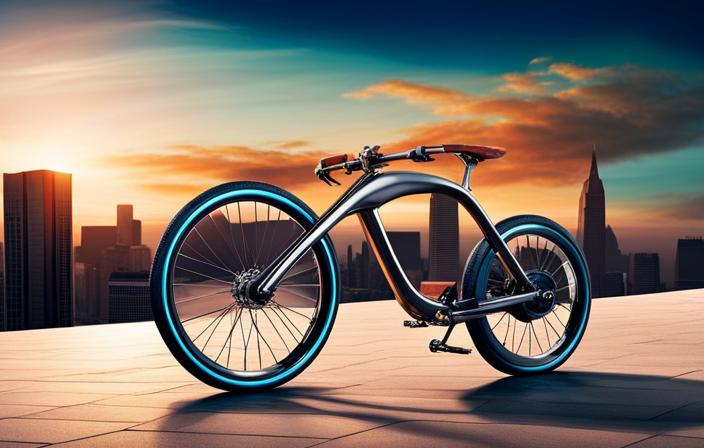
 Electric Bike3 weeks ago
Electric Bike3 weeks agoHow To Turn Your Bike Into An Electric Generator
-

 Vetted4 months ago
Vetted4 months ago15 Best Fixed Gear Bikes for Urban Commuting and Stylish Riding
-
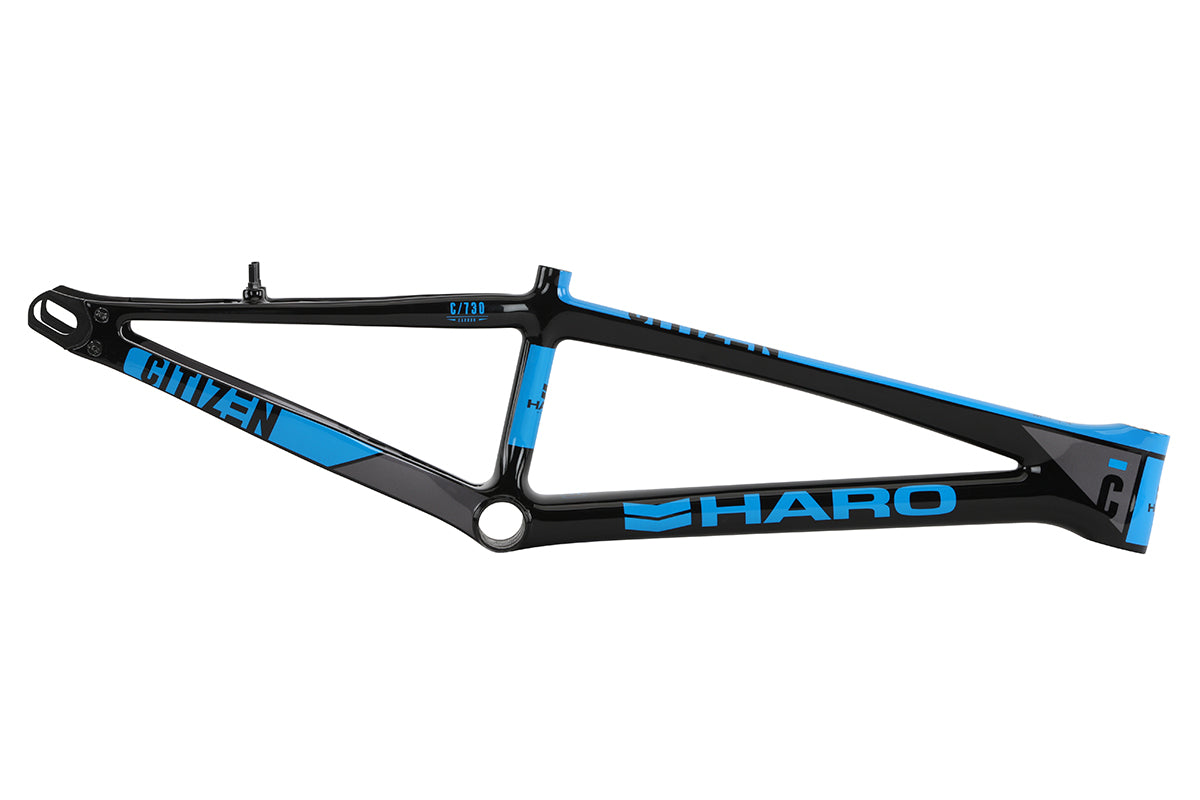
 Bike4 months ago
Bike4 months agoAdvantages and Disadvantages of a Carbon Fiber Bike Frame
-

 Vetted5 months ago
Vetted5 months ago15 Best Cycling Jerseys for Men to Elevate Your Riding Game
-

 Vetted5 months ago
Vetted5 months ago15 Best Cycling Gloves for Comfort and Performance – Ultimate Guide for Cyclists
-
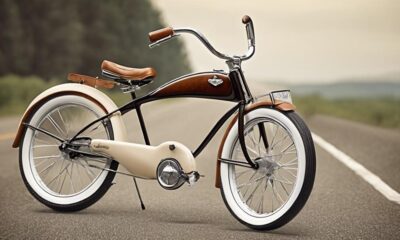
 Vetted4 months ago
Vetted4 months ago15 Best Cruiser Bikes to Hit the Road in Style
-

 Vetted4 months ago
Vetted4 months ago15 Best Comfort Bikes for a Smooth and Enjoyable Ride
